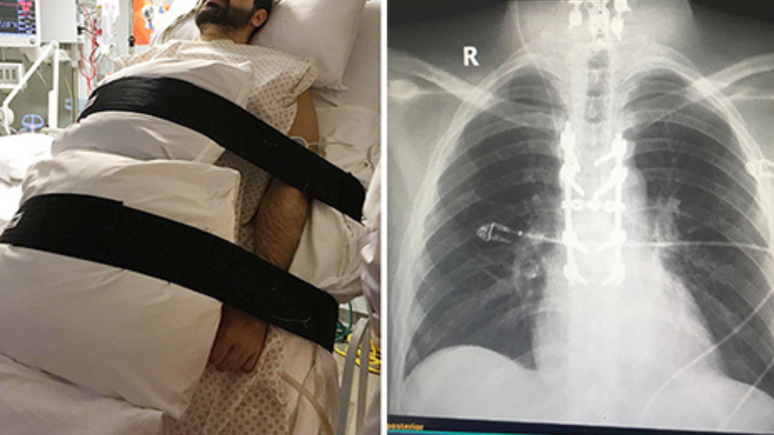Inflammation or infection of the labyrinth is a rare condition that also affects hearing
Just tell someone that you feel dizzy and, if you are an adult, you will hear that it could be labyrinthitis. This association is so common that the condition has practically become synonymous with the symptom, which may not be the case.
“Dizziness is actually one of the symptoms of labyrinthitis and numerous other diseases. And it is very common for people to come to the office already certain of the diagnosis,” says otoneurologist Nathália Prudencio, an otolaryngologist specializing in dizziness and tinnitus.
According to her, there are few cases in which the suspicion is confirmed. The doctor explains that labyrinthitis is a rare condition and that the dizziness is most likely related to other conditions.
Infection or inflammation in the labyrinth
Labyrinthitis is a condition characterized by inflammation or infection of the labyrinth, located in the inner ear. Since the labyrinth is responsible for hearing and balance, dizziness may occur.
“Usually, labyrinthitis is a consequence of a middle ear infection, meningitis or even an upper respiratory tract infection. However, today we have very effective treatments for these infections that can be administered early, resolving the problem within a few days. Therefore, it is unlikely that this infection will progress and affect the labyrinth. Therefore the diagnosis of labyrinthitis is rare, there are few cases that progress to this point”, comments the otoneurologist.
Other conditions that cause dizziness
Dizziness and vertigo are often related to other inner ear diseases, such as benign paroxysmal positional vertigo (BPPV). Popularly known as “crystal dizziness” (or also “crystal labyrinthitis”, although it is not labyrinthitis), this disease causes frequent dizziness that appears when the patient makes head movements, for example when standing up and walking or he lies down on the bed. .
It gets its name, crystal vertigo, because it occurs when the otoliths, small crystals involved in balance and located in the labyrinth, detach, usually spontaneously, generating this condition of vertigo that lasts a few seconds with the movement of the head.
Other possible causes of recurrent dizziness, according to your doctor, are vestibular migraine (a type of migraine that accompanies dizziness), vestibular neuritis (inflammation of the vestibular nerve, which is part of the inner ear) and Ménière’s disease ( caused by the accumulation of fluid in the inner ear).
Labyrinthitis has multiple symptoms
The appearance of dizziness without other associated symptoms is a good indication that the problem is not labyrinthitis. “Although dizziness is the most common symptom, labyrinthitis is also accompanied by changes such as nausea and vomiting, dizziness, sweating, ringing in the ears, hearing loss or nystagmus, which are small involuntary movements of the eyes”, underlines the doctor.
But it’s worth remembering that even if it’s not associated with auditory symptoms, dizziness should never be ignored. “Pay attention to the different aspects of dizziness. Are they short or prolonged? Is it an isolated case or do the attacks occur frequently? Are there associated symptoms? Are there triggers?”, emphasizes Nathália.
Isolated or recurring?
A single isolated dizziness that lasts no longer than a minute and is not accompanied by other symptoms is not a cause for concern. “Many people may suffer from isolated episodes of dizziness due to factors such as fasting, very hot days, lack of hydration and excessive physical exertion,” explains the specialist.
However, if the dizziness is persistent or recurring, it is important to investigate, as the symptom can increase the risk of falls and impair quality of life. “Some people experience dizziness simply when they get out of bed, which may be orthostatic dizziness caused by a sudden drop in blood pressure when they change position. Other people may experience dizziness, as well as nausea and headaches, during travel, which we call movement We must therefore always look for the cause of this dizziness, which can lead, in addition to ear problems, neurological and cardiac diseases, systemic changes, side effects of medications, among many other factors”, he warns.
Diagnosis and treatment of labyrinthitis
In general, the diagnosis is made based on patient reports. Depending on the case, some tests may be required. “In the case of labyrinthitis, for example, it is necessary to check whether there has been a previous infection, whether there are symptoms associated with dizziness, how this vertigo presents itself and whether there are changes in hearing, which occurs through audiometry “, explains the doctor.
Because labyrinthitis is linked to an infection, treatment generally involves rest, a balanced diet, hydration, and the use of medications to relieve symptoms, as well as antibiotics if it is a bacterial infection.
“But one should not take the diagnosis of labyrinthitis for granted and self-medicate, as this may not be the cause of dizziness, requiring a completely different treatment. Then consult an otoneurologist,” he concludes.
Source: Terra
Ben Stock is a lifestyle journalist and author at Gossipify. He writes about topics such as health, wellness, travel, food and home decor. He provides practical advice and inspiration to improve well-being, keeps readers up to date with latest lifestyle news and trends, known for his engaging writing style, in-depth analysis and unique perspectives.





![Such a wonderful sun in advance: Summary of Monday Episode of September 15, 2025 [SPOILERS] Such a wonderful sun in advance: Summary of Monday Episode of September 15, 2025 [SPOILERS]](https://fr.web.img6.acsta.net/img/98/a4/98a4e540e610e8334c398be1316f32f9.jpg)



